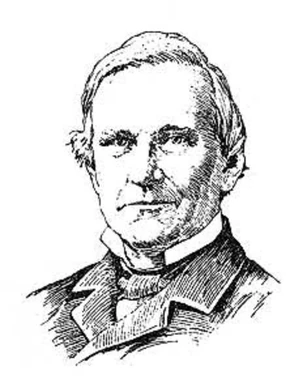
George Lunt (1803-1885). Sketch by Jacques Reich (1852-1923), from Appleton's Cyclopedia of American Biography, 1900. Courtesy Wikimedia Commons.
George Lunt (December 31, 1803 - May 17, 1885) was an American poet, prose author, editor, lawyer, and politician.
Life[]
Lunt was born in Newburyport, Massachusetts.[1] His ancestor, Henry Lunt, was an original settler of Newbury (in 1635). His grandfather's exploits with John Paul Jones were chronicled by James Fenimore Cooper.[2]
George Lunt attended Phillips Exeter Academy.[1] He graduated from Harvard College in 1824 with special distinction in Greek, studied law, and began practice in Newburyport in 1827.
In earlier life Lunt was an active member of the Whig party, and in its interests was distinguished as a public speaker. On the dissolution of that party he became a Democrat. He was elected successively representative for Newburyport and senator from Essex County in the legislature, was an active member of the convention that nominated General Zachary Taylor for the presidency, and was appointed United States District Attorney for Massachusetts under Taylor's administration. He eventually resumed the private practice of his profession, devoting his leisure to literary pursuits. When the Whigs dissolved, he joined the Democrats.[1]
Prior to and during the Civil War he was editor of the Boston Courier in conjunction with George S. Hillard. He opposed policies which would estrange the South, and defended slavery.[1] When he returned to the practice of his profession, he appeared frequently in the state courts, and was counsel before congressional committees in reference to French claims, preparing a bill and efficiently pressing it for the action of congress. Mr. Lunt's later years were marked by labors in behalf of harbors of refuge, notably at Scituate, Massachusetts, on the south shore of Boston bay. By persevering effort he succeeded in securing very considerable appropriations from congress to this end. He was a man of firm convictions in both political and religious matters, and fearless and manly in their expression. As a writer his style was marked by strength, dignity, and grace.[3]
Lunt died in Boston.
Writing[]
Edgar Allan Poe" "Mr. George Lunt of Newburyport, Massachusetts, is known as a poet of much vigour of style and massiveness of thought. He delights in the grand, rather than in the beautiful, and is not unfrequently turgid, but never feeble."[4]
Publications[]
Poetry[]
- Leisure Hours: A series of occasional poems. Boston: Cummings, Hilliard, 1826.
- The Grave of Byron, with other poems. Boston, Hilliard, Gray, Little, & Wilkins, 1826.
- Songs for the Whig Celebration, July 4, 1834 (by Grenville Mellen, Isaac McLellan, & George Lunt). Boston: printed by J.H. Eastburn, 1834.
- Poems. New York: Gould & Newman, 1839.
- The Age of Gold, and other poems. Boston: W.D. Ticknor, 1843.
- Culture: A poem. Boston: W.D. Ticknor, 1843.
- The Dove and the Eagle. . Boston: Ticknor, Reed, & Fields, 1851.
- Lyric Poems, Sonnets, and miscellanies. Boston: Ticknor, Reed, & Fields, 1854.
- Julia: A poem. Boston: Ticknor & Fields, 1855.
- The Rhymers Club (by "an honorary member"). New York: Baker & Godwin, 1859.[5]
- The Union: A poem. Boston: Crocker & Brewster, 1860.
- Requiem: Dedicated to the memory of the slain in battle. Boston: 1862.
- Poems. Boston: Cupples, Upham, 1884.
Novel[]
- Eastford, or Household sketches: A novel of New England life (by "Wesley Brooke"). Boston: Crocker & Brewster, 1854.
Non-fiction[]
- An Oration Delivered in Newburyport: On the fifty-seventh anniversary of American independence. Newburyport, MA: J.G. Tilton & B.E. Hale, 1833.
- An Oration Delivered before the Newburyport Artillery Company. Newburyport, MA: Press of Morss & Brewster, 1836.
- An Address, Eelivered before the Massachusetts Charitable Mechanic Association. Boston: Crocker & Brewster, 1844.
- An Address Delivered before the Massachusetts Horticultural Society. Boston: Dutton & Wentworth, 1845.
- Three Eras of New England, and other addresses. Boston: Ticknor & Fields, 1857.
- Radicalism in Religion, Philosophy, and Social Life. Boston: Little, Brown, 1858.
- Review of McLellan's Campaigns: As commander of the Army of the Potomac. Boston: Press of the Daily Courier, 1863.
- The Origin of the Late War: Traced from the beginning of the constitution to the revolt of the southern states. New York: Appleton, 1866.
- Old New England Traits. New York: Hurd & Houghton, 1873
Exept where noted, bibliographical information courtesy WorldCat.[6]
See also[]
References[]
Wilson, James Grant; Fiske, John, eds. (1900) "Lunt, George" Appletons' Cyclopædia of American Biography New York: D. Appleton
Notes[]
- ↑ 1.0 1.1 1.2 1.3 "Lunt, George". Dictionary of American Biography. VI, Part 1. New York: Charles Scribner's Sons. 1961. pp. 507–8.
- ↑ Cooper, James F. John Paul Jones (1846) Carey and Hart (via Naval Historical Center)
- ↑ Evert Augustus Duyckinck, George Long Duyckinck (1856). Cyclopaedia of American literature. C. Scribner. https://books.google.com/books?id=tq5tAAAAIAAJ&pg=PA438&dq=George+Lunt&lr=&cd=14#v=onepage&q=George%20Lunt&f=false.
- ↑ Edgar Allan Poe, "A Chapter on Autography {part II),” Graham’s Magazine 19 (December 1841), 273-286. Edgar Allan Poe Society, Web, Aug. 10, 2016.
- ↑ The Rhymers Club, Internet Archive. Web, Aug. 10, 2016.
- ↑ Search results = au:George Lunt, WorldCat, OCLC Online Computer Library Centre Inc. Web, Aug. 10, 2016.
External links[]
- Poems
- George Lunt at PoemHunter ("Requiem")
- George Lunt (1803-1885) info & 3 poems at English Poetry, 1579-1830
- George Lunt at Poetry Nook (51 poems)
- Books
- Works by George Lunt at Project Gutenberg
- George Lunt at Amazon.com
- About
| This page uses Creative Commons Licensed content from Wikipedia. (view article). (view authors). |
|